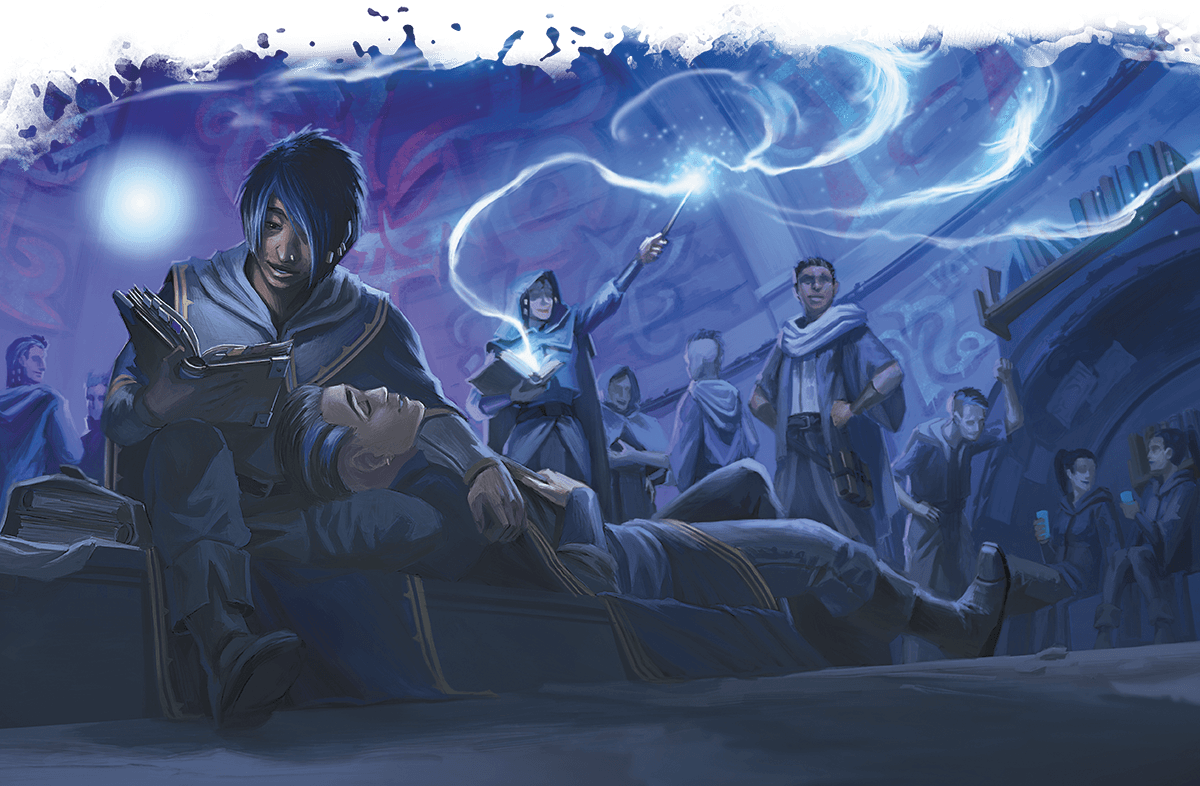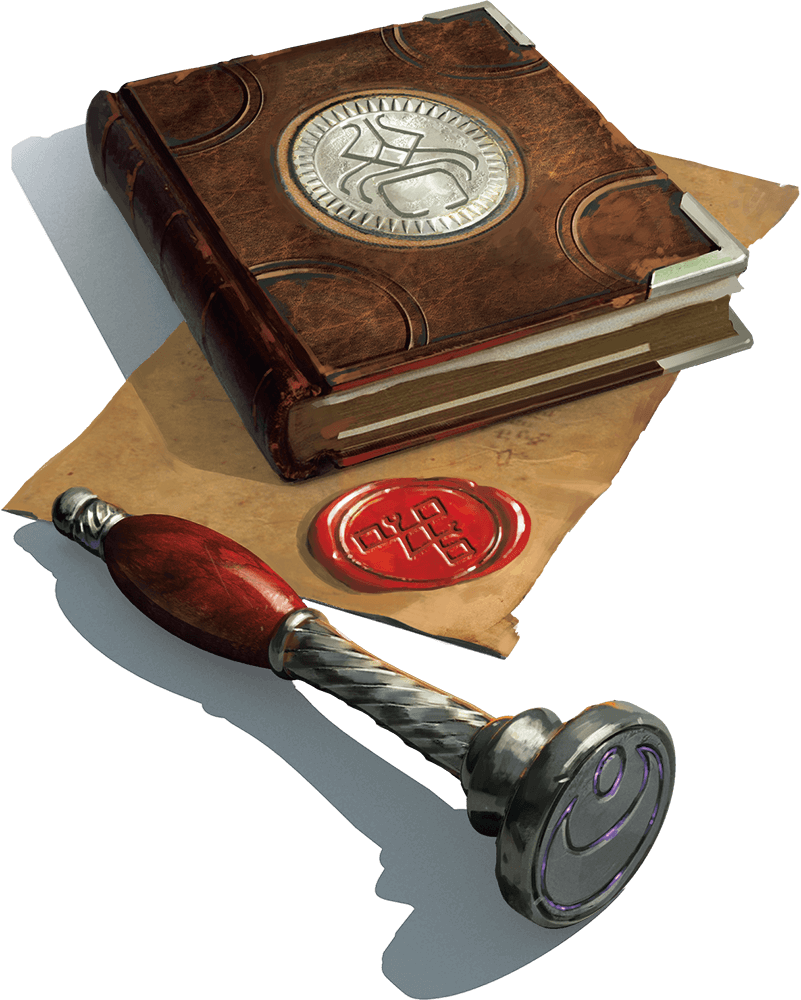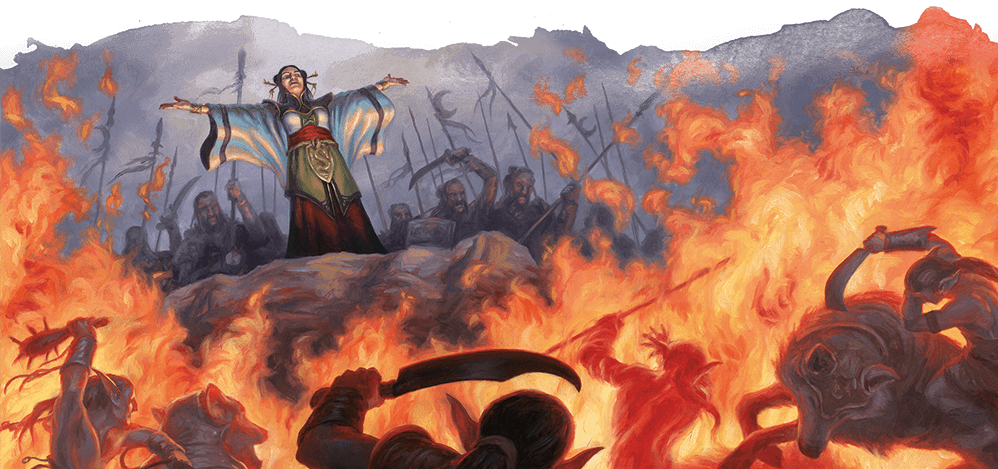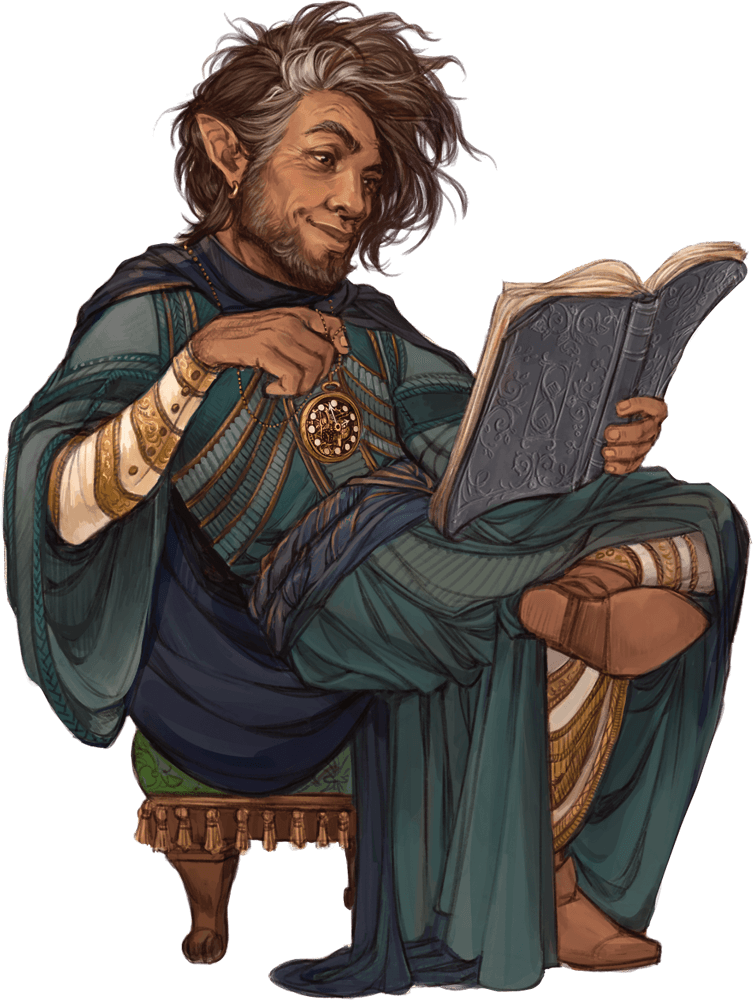“Books are a uniquely portable magic.”
-Stephen King
Wizards are without a doubt the most bookish class in Dungeons & Dragons. While other enchanters might receive their powers from bloodlines and eldritch patrons, wizards fill out their spell slots the old-fashioned way - through careful study and transcription of the printed page.
While there may be flashier schools of wizardry in D&D, if you’re someone who loves the image of an elderly magus who’s so fond of his spell tome that he actually managed to create a spectral version of it to fight alongside him, then a certain Arcane Tradition from Tasha’s Cauldron of Everything is perfect for you - particularly with this week’s release of Candlekeep Mysteries, a collection of adventures featuring the grandest library of the Forgotten Realms as a hub.
In other words, there’s no better time to hit the books and experiment with the Order of Scribes.

Order of Scribes features
Order of Scribes wizards specialize in quickly copying spells into their spellbooks, modifying spell damage types, gaining tactical advantage during combat or exploration, crafting spell scrolls, and surviving lethal blows by sacrificing bits of their magic.
- They gain two level 2 abilities. The first of these, Wizardly Quill, grants the wizard a magical quill that doesn’t require ink and can copy down spells at 2 minutes per spell level. Normally, wizards must spend a whopping 2 hours per level copying a spell, which forces this activity to be done in the downtime before or after a long rest. The Order of Scribes wizard faces no such problem, and could potentially scribble down the most potent magics from an enemy archmage’s stash in the middle of a dungeon crawl while the rest of the party stays alert.
- Their second level 2 feature, Awakened Spellbook, causes a sentience to emerge in the wizard’s spellbook. The wizard can now use the book as an arcane focus and cast spells as rituals using their normal casting time. They can also quickly replace their spellbook after a short rest without spending odious amounts of time and gold. (I played in an Out of the Abyss game with a gnome wizard who lost his spellbook after a drow battle and would’ve killed for this feature.) But the grand slam here is the ability to temporarily replace a spell’s damage type with another you possess that’s of the same level. (So no cantrips allowed.) More on this later, but yes, this does mean that if you cast the level 4 spell Ice Storm and have Sickening Radiance (also level 4) in your spellbook, you can shoot icicles that do radiant damage.
- Manifest Mind is the Order of Scribes level 6 ability. With this, the wizard can summon the mind of their Awakened Spellbook, getting something that’s a cross between a familiar and the Arcane Eye spell that possesses darkvision, can scout up to 300 feet ahead, and is intangible and impervious to damage. (It can disappear if hit with a Dispel Magic spell, though.) Best of all, the wizard can cast spells from the spectral mind’s space a number of times equal to their proficiency bonus. This grants the wizard a tremendous degree of mobility and range, meaning they can certainly bombard a den of undead from 300 feet away with those aforementioned radiant icicles if the occasion calls for it!
- The 10th level Order of Scribes feature is Master Scrivener, which lets the wizard pump out a scroll for level 1 or 2 spells after a long rest like a humanoid printing press. These scrolls are enhanced and count as one level higher than normal when used. Essentially, this gives the wizard a potentially endless array of magics that can be relied upon in a jiffy for the sake of reserving spell slots, and it’s a good idea to make this scroll creation process a daily ritual for any character choosing this Arcane Tradition.
- One With The Word is the final ability obtained at level 14. It grants an advantage on all Intelligence (Arcana) checks and allows the wizard to use a reaction to have their spectral mind absorb all damage from a blow. The mind will immediately vanish, and 3d6 must be rolled in what amounts to a potentially unpredictable outcome where the spellbook will temporarily lose spells of your choice that have a combined level equal to that roll or higher. (For instance, if the 3d6 roll is 6, you could dismiss one 6th level spell, two 3rd level spells, or some other combination.) The lost spells can be cast again once the wizard finishes 1d6 long rests. All in all, One With The Words carries risky consequences, but when you’re hit with a Beholder’s Disintegration Ray, this feature will definitely come in handy.
Benefits of the Order of Scribes
If nothing else, Order of Scribes wizards are versatile. They circumvent several of the busywork restrictions that plague other Arcane Tradition practitioners, such as the hefty time required to copy down new spellbook entries. While they’re not exactly tanks, they can take more than a few hits and remain standing thanks to One With The Word, and their ability to cast magic from afar via Manifest Mind and swap around damage types will surely appeal to D&D tinkerers who love crafting efficient character builds, tactically assessing a battle map and figuring out potent magic combos.
This degree of customization also extends to the Manifest Mind feature, which offers a myriad of roleplaying possibilities. The rules in Tasha’s Guide to Everything state that the mind resembles a ghostly tome, a cascade of text, or a scholar from the past, but generous DMs might be willing to have their players create an appropriate form that ties into a character’s backstory. Perhaps, for example, the mind could take on the appearance of the wizard’s long-departed spouse, representing the eternal connection of two hearts united as one.
Drawbacks of the Order of Scribes
The Order of Scribes tradition has been called niche by some, largely because its skill set is designed to thrive in a campaign that features varied foes with unusual resistances, as well as one that actually follows D&D’s rules when it comes to the time limits required for casting spells as rituals and copying down magic. If your DM is one who handwaves such minutiae, be aware that some of this Arcane Tradition’s more nuanced capabilities may remain on the back burner. If you’re also fearful of temporarily losing spells, the swingy nature of One With The Word may also seem like an underwhelming 14th level ability.
Some D&D fans who keep up with Unearthed Arcana have also critiqued the Order of Scribes as unoriginal, mostly because it’s a remix of a now-scrapped subclass for the Artificer known as the Archivist. Others prefer the more powerful Unearthed Arcana rules for the Order of the Scribes’ Awakened Spellbook, since they enabled players to swap a spell’s damage type with that of any spell in their spellbook - whereas the finalized rules restrict this to a spell of the same level.
Spells
Playing an Order of Scribes mage is all about amassing as many damage types as you can. The Awakened Spellbook text specifically states that you’re allowed to replace a spell’s damage type with one that appears in another spell of the same level, indicating that as long as it shows up in the spell’s text somewhere, you’re good to go. Keeping that in mind, here are some useful loadout possibilities from the Player’s Handbook, Xanathar’s Guide to Everything, and Tasha’s Cauldron of Everything.
As a reminder, D&D’s 13 damage types include acid, bludgeoning, cold, fire, force, lightning, necrotic, piercing, poison, psychic, radiant, slashing, and thunder.
- 1st Level spells: Chromatic Orb (acid, cold, fire, lightning, poison, thunder), Catapult (bludgeoning), Ice Knife (piercing), Magic Missile (force)
- 2nd Level spells: Cloud of Daggers (slashing), Dragon’s Breath (acid, cold, fire, lightning, poison), Dust Devil (bludgeoning), Phantasmal Force (psychic), Shatter (thunder)
- 3rd Level spells: Erupting Earth (bludgeoning), Glyph of Warding (acid, cold, fire, lightning, thunder), Spirit Shroud (cold, necrotic, radiant), Summon Undead (necrotic, poison)
- 4th Level spells: Blight (necrotic), Elemental Bane (acid, cold, fire, lightning), Ice Storm (bludgeoning, cold), Mordenkainen’s Faithful Hound (piercing), Phantasmal Killer (psychic), Sickening Radiance (radiant)
- 5th Level spells: Bigby’s Hand (bludgeoning, force), Cloudkill (poison), Cone of Cold (cold), Dawn (radiant), Enervation (necrotic), Immolation (fire), Transmute Rock (bludgeoning)
- 6th Level spells: Chain Lightning (lightning), Investiture of Flame (fire, cold), Investiture of Stone (bludgeoning, piercing, slashing), Sunbeam (radiant), Tasha’s Otherworldly Guise (fire, poison, radiant, necrotic)
- 7th Level spells: Crown of Stars (radiant), Finger of Death (necrotic), Prismatic Spray (acid, cold, fire, lightning, poison), Whirlwind (bludgeoning)
- 8th Level spells: Feeblemind (psychic), Illusory Dragon (acid, cold, fire, lightning, necrotic, poison) Sunburst (radiant)
- 9th Level spells: Blade of Disaster (force), Prismatic Wall (acid, cold, fire, lightning, poison), Weird (psychic)
This list doesn’t take into account the non-wizard spells and damage types that might become accessible if you’re following D&D’s multiclass rules. (Check out our How to Multiclass for Beginners article for more info!)
Speaking of multiclassing, one combination that’s achieved notoriety on the internet is an Order of Scribes Wizard who takes two levels of Tempest Cleric, giving them the ability to deal maximum Thunder or Lightning damage to an enemy once per short rest via Channel Divinity. Considering the damage swapping capabilities of the Order of Scribes, this could either be a match made in heaven or insanely overpowered, depending on whether you’re a player or a DM!
Feats
To supplement the Order of Scribes’ skillset, consider the following feats, which can add magic from other classes to your disposal without relying upon multiclassing or increase the wizard’s mobility and hardiness.
- Elemental Adept - This feat will let your spells ignore resistance to a certain damage type - acid, cold, fire, lightning or thunder - and also lets you treat any 1 on a damage die as a 2. This can be handy if you need to swap the damage type of a certain spell but don’t have anything prepared in your spell slots that’s of the same level.
- Eldritch Adept - To amplify the versatility of the Order of Scribes wizard, why not dip into the Warlock’s magic pool? Invocations like Eldritch Sight, which lets you cast Detect Magic at will, can be fantastic for conserving spell slots for those big damage swapping attacks that you specialize in.
- Fey Touched - Learning Misty Step for free and an additional 1st level spell - both of which can be cast once per long rest without expending a spell slot - is immensely useful, especially if you decide to use your spellbook’s spectral mind for scouting purposes and need to quickly teleport to its side.
- Magic Initiate - This feat will give you two cantrips from the bard, cleric, druid, sorcerer, or warlock spell lists, and even though cantrips can’t benefit from Awakened Spellbook, they’re still great to have. Plus, you get an extra 1st level spell to go along with them!
- Shadow Touched - Similar to Fey Touched, this lets you learn Invisibility for free and an additional 1st level spell that can be cast once per long rest without expending a spell slot. Imagine staying unseen to all as you unleash your magics from the space of your spectral mind. Who said that wizards can’t act like rogues?
- Telekinetic - This is an interesting choice that gives you an invisible Mage Hand and also lets you telekinetically shove one creature you can see within 30 feet. Once again, this supplements the Order of Scribe’s high mobility and can even serve as a unique way to maneuver allies around the battlefield.
- Warcaster - Warcaster’s just an easy choice for all wizards, letting them have an advantage on Constitution saving throws to maintain concentration and granting the ability to cast a spell as a reaction when attacks of opportunity are provoked.
The Order of Scribes wizard is one who trusts in the power of the book and knows that the quill is mightier than the sword. Consider playing this unique Arcane Tradition in the just-released Candlekeep Mysteries - for who better than a scribe to investigate the enigmas that lurk within mysterious grimoires?
For more on wizards, be sure to check out our overview of wizardly traditions in Wizard 101: A Beginner’s Guide to the Arcane Arts, as well as our in-depth looks at the School of Abjuration and the School of Evocation. And if you’d rather play another class, our entire Class 101 series is at your disposal.
Jeremy Blum (@PixelGrotto) is a journalist, gaming blogger, comic book aficionado, and fan of all forms of storytelling who rolled his first polyhedral dice while living in Hong Kong in 2017. Since then, he's never looked back and loves roleplaying games for the chance to tell the tales that have been swirling in his head since childhood.












-
View User Profile
-
Send Message
Posted Mar 23, 2021My personal favorite wizard type
-
View User Profile
-
Send Message
Posted Mar 23, 2021Great article! Though, for the purpose of the damage replacement feature, multiclassing does not expand the spell damage types to which this subclass has access. The Awakened Spell feature states "(...) you can temporarily replace [the spell] damage type with a type that appears in another spell in your spellbook (...)". The only spells that would count for damage replacement are those that the Wizard has in their spellbook, and not spells learned by other means.
On a side note, in our group we made a variant of the Order of Scribes: the Arcane Scribe, aiming for the versatility this class inspires. Any suggestions about the Arcane Scribe are welcomed :)
-
View User Profile
-
Send Message
Posted Mar 23, 2021Well, I guess Tulok the Barbarian from YouTube will have to build Zexion with this.
-
View User Profile
-
Send Message
Posted Mar 23, 2021*switches fireball to psychic damage*
-
View User Profile
-
Send Message
Posted Mar 23, 2021I actually really like this sub-class; my main criticism of it is that being able to swap out damage types easily steps on the toes of Sorcerers a lot (as they have to pay for that with a metamagic choice and sorcery points). This is a feature that would have made more sense for the comparatively weaker Artificer (being half casters) back when the idea was still for an Archivist sub-class, but it feels like a kick in the teeth to sorcerers who can already lag behind Wizards in various ways; people complain about the UA nerfing this feature, but I'm actually surprised WotC didn't drop the feature entirely, or make it limited in some way (e.g- uses tied to proficiency bonus, which is a common new mechanic in Tasha's Cauldron), as it's a bit of a "screw you" to sorcerers.
That aside, I do like the theme, and while some of the features are seriously niche, I really like Awakened Mind as a scouting or area control feature that doesn't require a Wizard to be in harm's way so much. I think the sub-class holds up pretty well even if your DM isn't a stickler for the spell scribing rules and such.
-
View User Profile
-
Send Message
Posted Mar 23, 2021A brain-shaped puff of smoke rolls out from the ground as you point your finger at the enemies. Suddenly, purple strands of energy lash out, slamming straight through enemies' minds and bowling all of them but one over, who dodged and sustained only a psychic spear through the chest.
-
View User Profile
-
Send Message
Posted Mar 23, 2021Very much this. For me, Haeck's 101 got too boilerplate toward then end (reasonable if he knew he was moving on in the near future), and the downsides are 100% better / more honest here.
For the damage swapping from multiclassing, I don't see it.
"When you cast a wizard spell with a spell slot, you can temporarily replace its damage type with a type that appears in another spell in your spellbook"
I have to be casting a wizard spell, and the replacing damage type also has to be in my spellbook. Knowing a Cleric spell that deals damage type X does nothing for me. What other caster has a spellbook? Tempest Clerics have always been abused for for that CD, Thor doesn't care, as long as you bring valor and glory to the halls of Asgard. And mead. Lots of mead.
-
View User Profile
-
Send Message
Posted Mar 23, 2021Thanks to those pointing out that multiclassing won't necessarily supplement the Awakened Spellbook feature. I should've been clearer about that (I blame this subclass' "gotta catch 'em all" tendency towards spells, which makes one think you can have everything), though off the top of my head I do believe that with an Order of the Tome Warlock multiclass (or a Ritual Caster feat) there is some wiggle room depending on if you have a generous DM who decrees that a ritual book can act as an extension of your spellbook, for instance.
-
View User Profile
-
Send Message
Posted Mar 23, 2021This is a good article, but absolutely packed with typos and mistakes. Here are the ones I’ve found:
Not a mistake, but it is worth mentioning that it seems that the mind stays until dispelled and doesn’t state that you can only have one at a time, making it possible to make an army of them in a few days time.
First off, it’s called Tashas Cauldron of Everything. Second, those are suggestions, not rules. Even in adventurers league you would be allowed to choose whatever you want to be your awakened mind.
Neither of those spells deal damage. They resist damage. You wouldn’t be allowed to use them.
I have no idea why, but it always bugs me when people call opportunity attacks attacks of opportunity.
Candlekeep Mysteries is a collection of one-shots.
-
View User Profile
-
Send Message
Posted Mar 23, 2021I don't think this is intended; while it doesn't state you can't have more than one, it also doesn't state that you can have more than one, and as a general rule spells and abilities only do what they say they do. The language of the feature makes it pretty clear that only one is intended, as it uses specifically singular terms throughout, and it's referring to manifesting the mind of your awakened spellbook, of which you can only ever have one, and there is nothing to suggest that an awakened spellbook has multiple minds to manifest.
They really should have clarified this in the part about it ending, i.e- "also ends when you attempt to conjure the mind again" but that feels like an omission rather than an intention to have a player conjure multiple minds.
-
View User Profile
-
Send Message
Posted Mar 23, 2021Yeah it uses "the" when referring to the mind, so I would agree that there is only one mind to summon.
-
View User Profile
-
Send Message
Posted Mar 23, 2021That’s always been the way though, just look at the Evocation Wizard’s Sculpt Spells vs the Sorcerer’s Careful Spell. The Sorcerer has to spend Sorcery Points to use theirs and it still does half damage and it only effects the first save on spells like sickening radiance or storm sphere. Metamagics have always been weaker and more limited than a (good) Wizard Subclass’s 2nd level driving feature but a Sorcerer gets to pick several of them and also gets a separate subclass with its own features. A Sorcerer gets to cast Careful Spells and Transmuted Spells while a Wizard has to choose between Sculpted Spells or Awakened Spellbook spells, two weaker features that have limited uses rather than one stronger feature that can be used unlimitedly. I still find Wizards to be better but they have been since the PHB dropped so Tasha’s is at least consistent.
-
View User Profile
-
Send Message
Posted Mar 23, 2021" It looks like a ghostly tome, a cascade of text, or a scholar from the past (your choice)." That's that full list of options, not merely examples or suggestions. Though "a scholar from the past" does give a fair amount of flexibility. Scholar of what, from how far into the past? I mean, I'm a scholar of bagels, from breakfast this morning. So if anyone wants to use my ugly mug as the manifestation of thier Awakened Spellbook, feel free! Or if your manifestation is of a more critical flavor, it could be in the image of your mother, scholar of kids who don't pick up thier own laundry no matter how many times I tell them, from when you were born thru the time there was finally some peace and quiet in this house (but I miss you, call more often!).
-
View User Profile
-
Send Message
Posted Mar 23, 2021Nowhere in the rules does it state that spells need to deal damage for you to swap their types, though. All it says is "when you cast a wizard spell with a spell slot, you can temporarily replace its damage type with a type that appears in another spell in your spellbook, which magically alters the spell's formula for this casting only." There's a lot of leeway with the phrase "appears in another spell," which is part of the fun with this subclass.
-
View User Profile
-
Send Message
Posted Mar 23, 2021If this is allowed, protection from energy also deserves a mention.
Also worth considering: The Crusher feat (and, to a lesser extent, Piercer and Slasher) might be an interesting option for this subclass, which has ways to trigger it that are not available to most spellcasters.
-
View User Profile
-
Send Message
Posted Mar 23, 2021For replacing damage type, a lot of people seem to me missing the impact of this sentence: "The latter spell must be of the same level as the spell slot you expend."
In other words, if I want to cast the 3rd-level spell Fireball using a 5th-level spell slot but do cold damage, I would need to have something like Cone of Cold in my spellbook.
This means that multi-classing as another spellcaster really hurts because you effectively lose the damage replacement ability when using spell slots that are higher than the highest level of spell in your spellbook.
-
View User Profile
-
Send Message
Posted Mar 23, 2021They did those first, a long time ago now.
-
View User Profile
-
Send Message
Posted Mar 23, 2021This is a fun one. It's basically doubling down on a wizard's wizardliness, and a lot of times, doing that can be more fun than subverting the trope, not just for wizards but for any character type.
For feats, you might consider Metamagic Adept. A Scribes wizard with the ability to Quicken, Twin or Subtly cast a spell once a day would be interesting.
-
View User Profile
-
Send Message
Posted Mar 23, 2021They did 3 rounds of the PHB subclasses. They didn't finish the remaining wizard and cleric subclasses after the first 3.
-
View User Profile
-
Send Message
Posted Mar 24, 2021Same. :’(